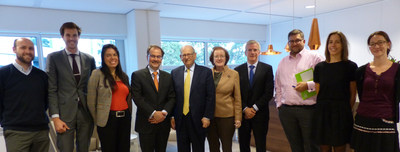Dr Robert E. Kahn and Ms Patrice Lyons visit Permanent Bureau to discuss e-APP

Monday 10 October, the Permanent Bureau had the great pleasure of welcoming Dr Robert E. Kahn, co-inventor of the Transmission Control Protocol (TCP) / Internet Protocol (IP), President and CEO of the Corporation for National Research Initiatives (CNRI), and Chair of the DONA Foundation, and Ms Patrice Lyons, General Counsel to CNRI.
Dr Kahn and Ms Lyons have been following with great interest the development and operation of the electronic Apostille Program (e-APP) under the Hague Convention of 5 October 1961 Abolishing the Requirement of Legalisation for Foreign Public Documents (Apostille Convention). They contacted the Permanent Bureau to discuss possible applications of the Digital Object Architecture (DOA) within the e-APP. DOA is part of the information management technology and software under development for many years by CNRI in Reston, Virginia, USA.
This architecture, which is based on individual identifiers for objects and files, ensures, among other advantages, longevity and security of data on the internet and has the potential to become the web architecture of the 21st century.
HCCH Secretary General Christophe Bernasconi, together with several other representatives of the Permanent Bureau discussed at length with Mr Kahn and Ms Lyons some of the many ways in which the potential of DOA can be harnessed to benefit not only the operation of the e-APP and the Apostille Convention, but also various other Hague Conference instruments.
Secretary General Bernasconi expressed that this very informative meeting was a very positive first step towards a possible future cooperation of the HCCH with Dr Kahn and his colleagues. On the occasion of the e-APP Forum on 1 November 2016 in the Hague, the Executive Director of the DONA Foundation, Christophe Blanchi, will address the possible applications of DOA within the e-APP. Contacts with world-renowned technology experts such as Dr Kahn are most interesting and beneficial to ensure that the Hague Conventions and instruments remain efficient and effective in the fast-paced, ever-changing world of technological developments.